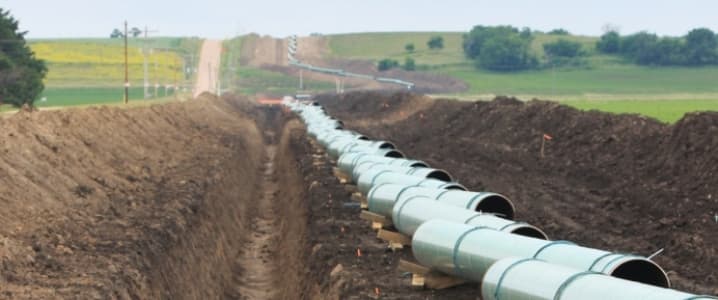Canada declared a national climate emergency on Monday. The next day, Prime Minister Justin Trudeau gave the greenlight to a massive oil sands pipeline.
The House of Commons, with strong support declared climate change a “real and urgent crisis.” A week before, Justin Trudeau proposed a ban on single-use plastics, which, if implemented, would be the latest in a growing number of bans on plastic that could put multibillion-dollar bets on plastics and petrochemicals by the oil industry at risk.
But Trudeau has never really stood in the way of Canada’s oil industry, despite years of platitudes about addressing climate change. That was clear on June 18, when he gave the approval to the Trans Mountain Expansion (not for the first time), a $4.5 billion twin pipeline that would run along an existing line from Alberta to the Pacific Coast in British Columbia.
The Trans Mountain Expansion is one of a few high-profile pipeline projects that have run into serious trouble. Trudeau first gave the greenlight in 2016, but the project ran aground amid legal challenges from First Nations and environmental groups. Last year, Kinder Morgan, the original owner of the project, headed for the exit, threatening the cancel the project altogether.
Desperate to keep it alive – and the clearest example imaginable of how much the Canadian government depends on the oil industry – Trudeau moved to nationalize the project in mid-2018, buying it off of Kinder Morgan’s hands. A year later, here we are, with Ottawa once again trying to push it forward.
“This isn’t an either/or proposition. It is in Canada’s national interest to protect our environment and invest in tomorrow, while making sure people can feed their families today,” Trudeau said on Tuesday. Despite Trudeau’s plea, many see it precisely as an either/or proposition. Faced with a binary choice, Trudeau could either anger the oil industry, or anger First Nations and environmental groups. He chose the former, even though that was mostly expected. Related: Oil Prices Jump On Hopes Of End To U.S.-China Trade War
“The approval comes as no surprise—the federal government owns the pipeline after all,” Scotiabank’s Rebekah Young wrote in a note. The Canadian government has vowed to build the project with a Crown corporation, then turn it over to private investors or some other company.
But the next step is unclear.
The approval from Trudeau’s government is a “positive step” for the project, but “project execution risk remains elevated,” Goldman Sachs wrote in a note to clients. The investment bank said that while the government plans to begin construction this year, Goldman is not factoring the project into its base-case forecasts, “given prior uncertainty in the outlook of this project.”
“Today’s decision is a positive development for Canada’s western oil sector, but it will have little impact on short term production,” Rebekah Young for Scotiabank said. The expansion will triple the pipeline system’s current capacity, taking it up to 890,000 bpd. “However, with the earliest completion date only by 2022,” Young added.
Still, commencing construction on the project would be seen as a breakthrough for Canada’s oil industry. “We would also anticipate that reaching surety in construction of TMX would provide oil sand producers confidence to commence re-investing in production growth, given the capital constrained budgets most companies are now operating under,” Goldman analysts said. “That said, we continue to see pipeline shortages until at least 2022…and during this period from now until then, see light-heavy differentials wider than pipeline economics.”
The inability to build a new pipeline had diminished production growth in Canada’s oil sands, and could limit output in the long run. The Canadian Association of Petroleum Producers (CAPP) just released its 2019 Crude Oil Forecast, and lowered its estimate for production growth to 1.44 percent annually through 2035, less than half its prior estimate from 2014. “Pipeline constraints, a lack of market diversity, and inefficient regulations are largely responsible for holding back Canada’s oil sector,” CAPP said.
Oil forecasts aside, the Trans Mountain Expansion will still run into stiff resistance from First Nations and environmental groups. “The Trudeau government does not have the right to put a pipeline through unceded Secwepemc land,” spokeswoman Kanahus Manuel said, according to Reuters. More lawsuits and protests are inevitable. Related: Norwegian Oil Pioneer: Big Oil’s Exodus Has Started
Moreover, the pipeline needs permits from British Columbia, where the government has opposed the project.
“[T]he project still faces significant political, regulatory, and judicial challenges, and ultimately we see a tremendous amount of execution risk up until the oil starts flowing,” Gavin MacFarlane, a VP with Moody’s Investors Service, said in comments circulated to reporters.
ADVERTISEMENT
Meanwhile, the other pipeline that could potentially add takeaway capacity from Alberta – Enbridge’s Line 3 replacement – hit another snag. State agencies in Minnesota said on Tuesday that they would not issue permits until a revised environmental review was completed, following a recent court order that said the state had failed to adequately assess the potential impact of an oil spill. In short, permits could be delayed longer than expected.
If Line 3 fails to move forward for any reason, that increases the stakes and importance for the Trans Mountain Expansion as the only route left for new pipeline capacity. And vice versa.
By Nick Cunningham of Oilprice.com
More Top Reads From Oilprice.com:
- Are Oil Prices About To Bounce Back?
- Bullish EIA Data Pushes Oil Prices Higher
- Oil Markets Ignore A World On The Brink Of War


















